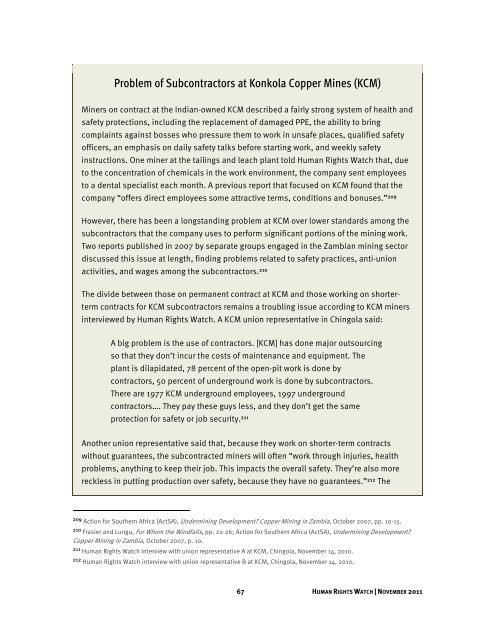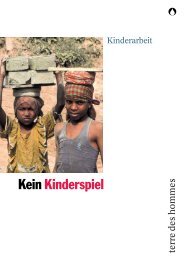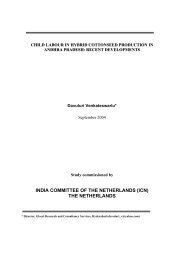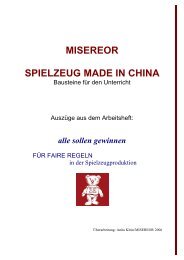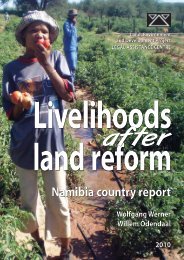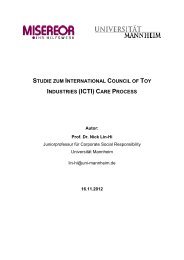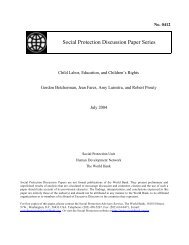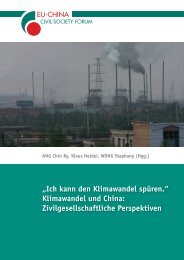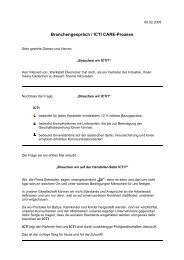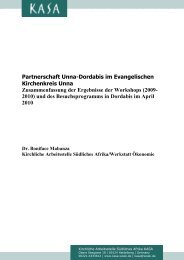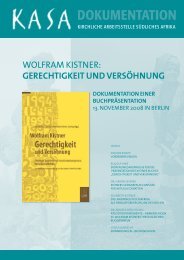“You'll Be Fired if You Refuse†- Human Rights Watch
“You'll Be Fired if You Refuse†- Human Rights Watch
“You'll Be Fired if You Refuse†- Human Rights Watch
You also want an ePaper? Increase the reach of your titles
YUMPU automatically turns print PDFs into web optimized ePapers that Google loves.
Problem of Subcontractors at Konkola Copper Mines (KCM)<br />
Miners on contract at the Indian-owned KCM described a fairly strong system of health and<br />
safety protections, including the replacement of damaged PPE, the ability to bring<br />
complaints against bosses who pressure them to work in unsafe places, qual<strong>if</strong>ied safety<br />
officers, an emphasis on daily safety talks before starting work, and weekly safety<br />
instructions. One miner at the tailings and leach plant told <strong>Human</strong> <strong>Rights</strong> <strong>Watch</strong> that, due<br />
to the concentration of chemicals in the work environment, the company sent employees<br />
to a dental specialist each month. A previous report that focused on KCM found that the<br />
company “offers direct employees some attractive terms, conditions and bonuses.” 209<br />
However, there has been a longstanding problem at KCM over lower standards among the<br />
subcontractors that the company uses to perform sign<strong>if</strong>icant portions of the mining work.<br />
Two reports published in 2007 by separate groups engaged in the Zambian mining sector<br />
discussed this issue at length, finding problems related to safety practices, anti-union<br />
activities, and wages among the subcontractors. 210<br />
The divide between those on permanent contract at KCM and those working on shorterterm<br />
contracts for KCM subcontractors remains a troubling issue according to KCM miners<br />
interviewed by <strong>Human</strong> <strong>Rights</strong> <strong>Watch</strong>. A KCM union representative in Chingola said:<br />
A big problem is the use of contractors. [KCM] has done major outsourcing<br />
so that they don’t incur the costs of maintenance and equipment. The<br />
plant is dilapidated, 78 percent of the open-pit work is done by<br />
contractors, 50 percent of underground work is done by subcontractors.<br />
There are 1977 KCM underground employees, 1997 underground<br />
contractors…. They pay these guys less, and they don’t get the same<br />
protection for safety or job security. 211<br />
Another union representative said that, because they work on shorter-term contracts<br />
without guarantees, the subcontracted miners will often “work through injuries, health<br />
problems, anything to keep their job. This impacts the overall safety. They’re also more<br />
reckless in putting production over safety, because they have no guarantees.” 212 The<br />
209 Action for Southern Africa (ActSA), Undermining Development? Copper Mining in Zambia, October 2007, pp. 10-15.<br />
210 Frasier and Lungu, For Whom the Windfalls, pp. 22-26; Action for Southern Africa (ActSA), Undermining Development?<br />
Copper Mining in Zambia, October 2007, p. 10.<br />
211 <strong>Human</strong> <strong>Rights</strong> <strong>Watch</strong> interview with union representative A at KCM, Chingola, November 14, 2010.<br />
212 <strong>Human</strong> <strong>Rights</strong> <strong>Watch</strong> interview with union representative B at KCM, Chingola, November 14, 2010.<br />
67 HUMAN RIGHTS WATCH | NOVEMBER 2011


